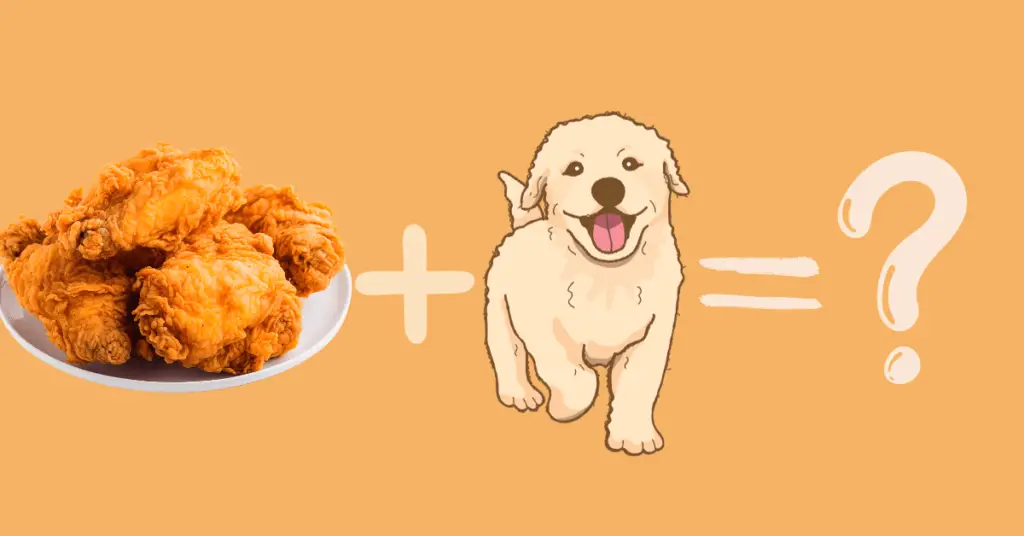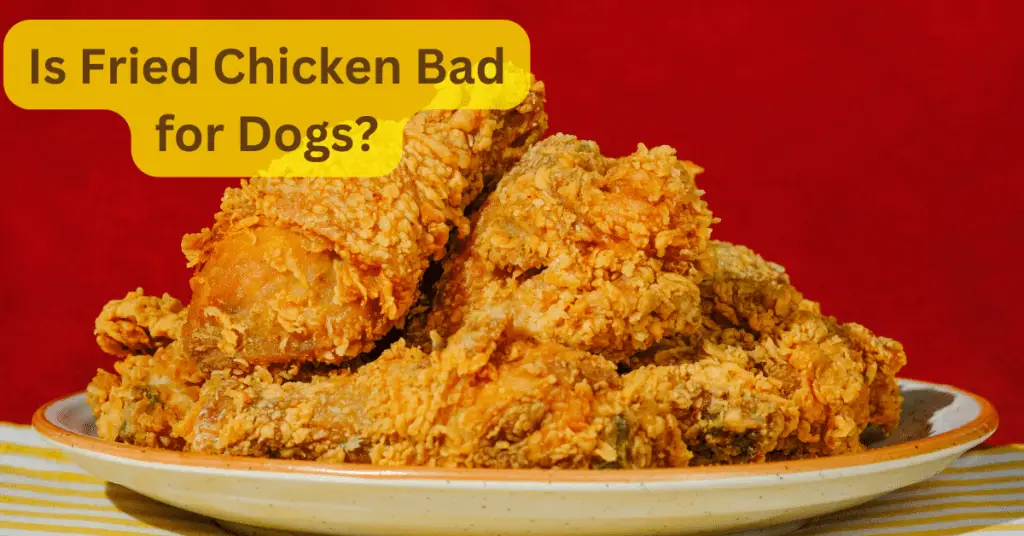
When it comes to our furry friends, we often wonder if we can share our favorite treats with them. One burning question that many pet owners have is, Can dogs eat fried chicken? Is fried chicken bad for dogs? In this comprehensive guide, we’ll dive deep into this delicious yet potentially risky topic. We’ll provide expert advice, share valuable insights, and answer common questions to help you make informed decisions about your canine companion’s diet.
Can Dogs Eat Fried Chicken?
Dogs can not eat fried chicken because it’s not a safe or healthy choice for them. Can dogs eat fried chicken? The answer is a resounding no. Unhealthy fats and high levels of salt, along with bones, load fried chicken. These components can lead to a range of health issues for dogs, including obesity, pancreatitis, sodium ion poisoning, choking hazards, and intestinal blockages from splintered bones. If you want to give your furry friend a special treat, it’s best to opt for safer alternatives like plain, unseasoned, and boneless cooked chicken in moderation. Always prioritize your dog’s well-being when considering what they eat, and consult with a veterinarian for guidance on their dietary needs.
The Dangers of Fried Chicken for Dogs
Dogs can’t digest fried foods as effectively as humans, which can result in upset stomachs and even more severe conditions like pancreatitis. Additionally, the bones in fried chicken can splinter, posing a choking hazard or causing intestinal blockages.
Moderation Is Key
If you decide to share a small amount of plain, unseasoned, and boneless fried chicken with your dog, moderation is key. Make sure it’s an occasional treat, not a regular part of their diet.
Is Fried Chicken Bad for Dogs?

Yes, fried chicken is bad for dogs. It’s loaded with unhealthy fats, high levels of salt, and often includes bones, making it a risky and potentially harmful choice for your canine companion. Feeding fried chicken to dogs can lead to various health issues, including obesity, pancreatitis, sodium ion poisoning, choking hazards, and intestinal blockages from splintered bones.
Risks Associated with Fried Chicken
When it comes to the risks associated with feeding fried chicken to dogs, it’s crucial to be aware of the potential dangers. Fried chicken, while delicious to us, poses significant health risks for our canine companions. Here are the key risks to consider:
1. High Fat Content:
Fried chicken is notorious for its high fat content. While this might be mouthwatering for humans, it’s problematic for dogs. Excessive fat consumption can lead to obesity in dogs, which associates it with various health issues, including heart problems and diabetes.”
2. Salty Conundrum:
The salt content in fried chicken is considerably high. Dogs have a lower tolerance for salt than humans, and excessive salt intake can lead to sodium ion poisoning. Symptoms may include excessive thirst, urination, and, in severe cases, seizures.
3. Bone Hazards:
Chicken bones, especially when fried, become brittle and can splinter easily. This poses a significant choking hazard or, even worse, can lead to dangerous blockages in a dog’s digestive system. Ingesting sharp bone fragments can cause mouth injuries or harm the intestines.
4. Seasoning and Spices:
A variety of spices and herbs season fried chicken, which can irritate a dog’s stomach and cause gastrointestinal distress. These seasonings are often too strong for a dog’s sensitive digestive system.
Safe meat options for dogs
When looking for safe meat options for your dog, it’s essential to consider their health and well-being. While many dogs enjoy bacon as a tasty treat, its high salt and fat content can lead to various health issues, making it advisable to give it in extreme moderation or avoid it altogether.
Safer meat options for dogs include:
- Lean Chicken: Boneless, skinless, and unseasoned cooked chicken is a great choice. It’s low in fat and rich in protein, making it a healthy option.
- Turkey: Similar to chicken, plain cooked turkey without seasoning or bones can be a tasty and safe treat for your pup.
- Beef: Lean cuts of beef, such as sirloin or tenderloin, can be given to dogs in moderation. Ensure it’s thoroughly cooked and free from spices or seasoning.
- Fish: Moreover, some dogs enjoy fish, which is a good source of omega-3 fatty acids. However, be cautious with fish bones, and always choose boneless options like salmon or tuna.
- Lamb: Lean cuts of lamb can be a suitable choice, but like other meats, it should be cooked and served without any added seasonings.
Remember that, while you can offer these meats as treats, they should never replace your dog’s regular, balanced diet.
FAQs about Dogs and Fried Chicken
Q: Can I feed my dog small pieces of plain fried chicken?
A: Yes, in moderation and only if it’s unseasoned, boneless, and not a regular part of their diet.
Q: What if my dog accidentally swallows a chicken bone?
A: In case of such an emergency, contact your veterinarian immediately, as it can be a life-threatening situation.
Q: Is it okay to share fried chicken skin with my dog?
A: While it’s less risky than the meat, it’s still high in fat and should be shared sparingly.
Q: Are there any dog-friendly alternatives to fried chicken?
A: Yes, you can offer your dog lean, cooked chicken without seasonings as a safer alternative.
Q: Can I give my dog fried chicken as a training reward?
A: It’s not advisable due to its high fat and salt content; consider healthier treats for training.
Q: What signs indicate that my dog may have consumed too much fried chicken?
A: So, watch for symptoms like vomiting, diarrhea, lethargy, and abdominal discomfort.
Can Dogs Eat Fried Chicken? Conclusion
In the end, it’s clear that while dogs can not eat fried chicken, it comes with significant risks to their health. The high fat, salt, and bone hazards make it a treat that should be given sparingly, if at all. Remember, the well-being of your furry friend should always be a top priority. It’s crucial to consult your veterinarian for personalized advice on your dog’s dietary needs. Be sure to explore safer and healthier alternatives to satisfy your dog’s cravings and maintain their good health.

Can you be more specific about the content of your article? After reading it, I still have some doubts. Hope you can help me.
Very interesting information!Perfect just what I was searching for!Raise blog range